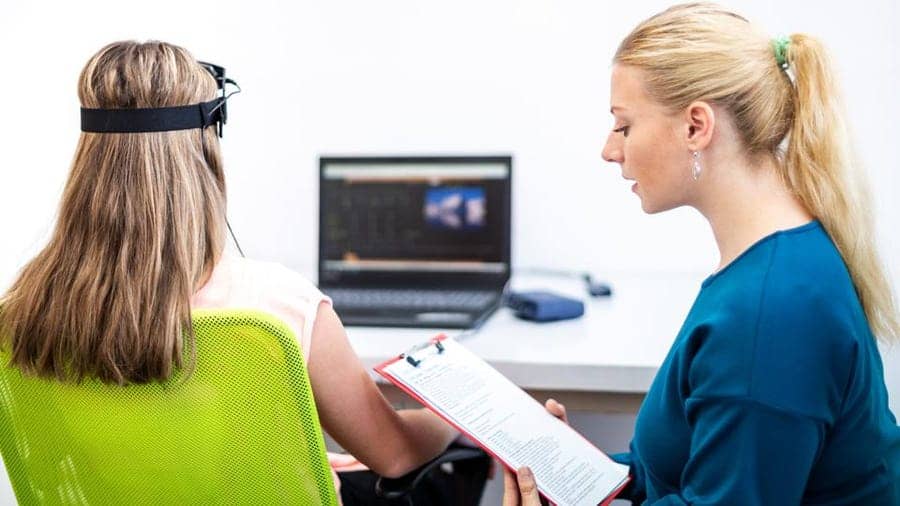We are now offering completely customized virtual neuropsychological testing assessments and remote neurofeedback! Schedule your assessment and treatment today
Have you been struggling with headaches for years? Does nothing seem to touch them? The solution may be found with our headache specialists.
(Source)

This headache type typically causes mild-to-moderate pain or pressure that feels like your head is being squeezed. They can be stress-related or caused by muscle issues in the neck. For some people, tension headaches are a chronic condition that can occur for 15 days out of each month.
Cluster headaches can appear unexpectedly and have no pattern. They cause excruciating pain around one eye or on one side of your head. You’ll have frequent cluster headaches for weeks or months before going into remission.
Migraines cause an intense throbbing pain often focused around one temple but may affect both sides of your face. Migraines develop in response to certain triggers and can last 4-72 hours. In addition to severe pain, you’ll also have symptoms such as nausea, vomiting, and sensitivity to lights, sounds, and smells.
If you’re searching for a headache specialist near you, visit Abbey Neuropsychology Clinic in Palo Alto, California. The clinic also offers telehealth to clients in California, Texas, and Florida!
Chronic headache treatment is considered pain management, which is complex for both the doctor and the patient. Every person with a migraine or headache has different needs—what works for one person will not work for another.
While many have found success with medication, others feel like it only treats symptoms or doesn’t have any effect at all.
Depending on the situation, medication may not help due to a misdiagnosis or continuous exposure to triggers. Occasionally, medication can cause more problems, which is why people often search for natural treatments for chronic headaches.
The complexity of headache treatment is why it’s crucial to communicate your needs and symptoms when working with a headache specialist.


The headache specialists at Abbey Neuropsychology Clinic offer therapies that relieve your symptoms by getting to the source of your headache. Some of the advanced therapies they offer include:
If you experience chronic stress, you may have dysregulated breathing patterns that contribute to muscle tension and, subsequently, to tension headaches. Biofeedback helps you learn to regulate stress, relax muscles, and explore other natural tension headache treatments.
Neurofeedback is a noninvasive treatment that directly regulates activity in your brain, potentially targeting the source of some headaches. Neurofeedback works for migraines because it trains your brain to respond more effectively to migraine-inducing stress and triggers.
Red light therapy for headaches may relieve symptoms when caused by proinflammatory conditions, such as Lyme disease or fibromyalgia. Infrared light stimulates cellular energy and reduces inflammation.
Headaches often arise when you have ongoing stress, anxiety, and depression. With talk therapy, your provider at Abbey Neuropsychology Clinic can help you learn coping mechanisms that reduce your challenges and your headaches.
To get relief from your headaches, call Abbey Neuropsychology Clinic to schedule an appointment.
There are more than 150 types of headaches, but they’re all placed in one of two categories:
Primary headaches are associated with problems in your head or neck, often due to muscle tension or changes in nerves and blood vessels. Migraines, cluster headaches, and tension headaches are all primary headaches.
Secondary headaches develop due to an underlying health condition. For example, a concussion, sinus infection, and a jaw disorder can all cause a secondary headache.
There are many potential triggers—and it really depends on the individual. However, the most common headache triggers are:
You should see a medical professional if chronic headaches affect your daily life. While painful, headaches should not continuously disrupt your life.
A headache can be an emergency as it can be a symptom of a stroke or meningitis. Emergency symptoms that occur along with a headache include:

Neuropsychological assessments are an invaluable diagnostic tool for psychiatric, developmental, and neurocognitive conditions like ADHD, depression, autism, and dementia. The team at Abbey Neuropsychology Clinic in Palo Alto, California…..

Trustindex verifies that the original source of the review is Google. Nothing short of amazing, the care, attention, empathy, and avoidance of any kind of stigma, I cannot say enough good things about the Abbey Clinic.Posted onTrustindex verifies that the original source of the review is Google. I highly recommend Abbey Clinic! They have done an incredible job helping both our children. Our team includes Dr. Abbey, Dr. Kaberta, Rachelle, Julia, Stefanie, and on occasion, Andrew. Our children have made incredible strides in emotion regulation, reading, social interaction, and overcoming sensory struggles. The important thing to note is that doing their program requires a significant financial commitment and a large time commitment. If you are able and willing to do both, you will see jaw dropping improvements. It is hard to be patient, but following the process is worth it. We feel so fortunate to have found them. After years of other therapies and tutoring, neurofeedback has worked the very best. Teachers and family members have been amazed, and I love that my children will have a better future. As a psychologist for work, I was very skeptical about the process because we are taught that neurofeedback is quackery. In a desperate move, we reached out to Abbey Clinic and it took us over a month to make a decision to move forward. They were patient, answered all our questions, and did not pressure us. If your children are the most important people in your life, you are tired of people staring at them in public because of their needs, and you are in a position to give your kids your all, then this is what works. It has worked better than countless OTs, speech, tutors, and other intensive therapies. We have a child that now talks to us in complete sentences and has full conversations, is making steady strides in catching up with reading, and can now participate in social settings in a room with a lot of people. Our other child is steadily overcoming dyslexia. We look forward to seeing where both will go. Do not listen to all the doomsday prophet health practitioners who say your child’s life will be limited, but be patient with the process. Make a commitment for at least 40 sessions to begin with, and see where it takes you. You won’t be sorry!Posted onTrustindex verifies that the original source of the review is Google. My three kids have doubled their attention span and focus. All their grades are now A+, and behavior has been exceptional. Big improvements across the board. More substantially their confidence has increased and now have very few conflicts and get along well. The energy in the home has shifted. Comments about my kids are, “they are going somewhere…” and “what intelligent well behaved children you have.” Their prep and post brain scans were AMAZING to see. They are scientists w this stuff. Dr Abby and his team have been very hospitable, kind and helpful. They have helped my brain optimize to myself and overcome focus issues. My company last year got a valuation into the 9 figures. I know I couldn’t have done it w out them. They are an accelerator and asset for increase’s productivity and profitability as I have seen in my business. But I’ve noticed being more in control of my thoughts and emotions. One of my kids had neurological challenges which have been resolved within cycle of work with them. We have kept our kids on their program… why wouldn’t I keep my kids brain in the gym? His kids won awards for the smartest kids in California… I want to follow the legacy he’s creating… I couldn’t recommend them enough!!!Posted onTrustindex verifies that the original source of the review is Google. Our service received today on our initial sessions preparation call was excellent. Julia did a first-class, thorough and helpful job. We were very appreciative of her knowledge and helpful approach.Posted onTrustindex verifies that the original source of the review is Google. Lemme just put in the review first YET i have not particiapted with their activities with Abbey. I would love to participate but just want to genuinely ask how do people afford this without insurance (500+ per therapy sessinon and ~7k evaluation) on a regular basis. Or are there any other ways that can compensate the fees. Any insights are greatly appreciated!Posted onTrustindex verifies that the original source of the review is Google. I'm a successful startup founder but in the last 20 years I've spent over $250k on doctors, psychiatrists, therapists, dual-diagnosis clinics, and even crazy stuff like IV-ketamine therapy to figure out "what is wrong with my brain". The Abbey Clinic gave me the answers; now they're providing my therapy. I have yet to find a comparable clinic in the Bay Area. For me, they were truly a lifesaver. Shout-out to Dr Korsmo, Dr Barrett, Jordann, and Andrew. 🙏Posted onTrustindex verifies that the original source of the review is Google. Reports show tremendous improvements in simple attention, complex attention, executive functioning, cognitive flexibility and tremendous improvement in alpha and beta waves control after 6 months. We saw immediate improvement in communication after the first month. Later on, we saw improvement in attention and executive functioning. The team we are working with at Abbey clinic is professional, friendly and supportive. Special thanks to Andrew Moses who conducts the Bi-weekly sessions. He is very nice and friendly. We would also like to thank Rachel and Paula who meet with us to discuss and explain the reports, results and future plans.Posted onTrustindex verifies that the original source of the review is Google. I feel that my experience with Abby has been excellent. The price is very very high and insurance usually does not cover it but it is definitely worth it if you have a lot of money to spare. I feel almost like a completely different person now, more focused, less anxious, and more relaxed.Posted onTrustindex verifies that the original source of the review is Google. We were fortunate to hear about Abbey Clinic from our neighbor. I had no idea how to find a therapist. Both my kids are pretty regular learners and didn't really need much support outside of school, but when my teenager's life went completely sideways junior year from a brain injury, the biggest help were the sessions with Rachael Little. The sessions taught him coping skills and methods to approach life. He is doing so well in college and still uses the things he learned with Rachael. Thank you!Posted on